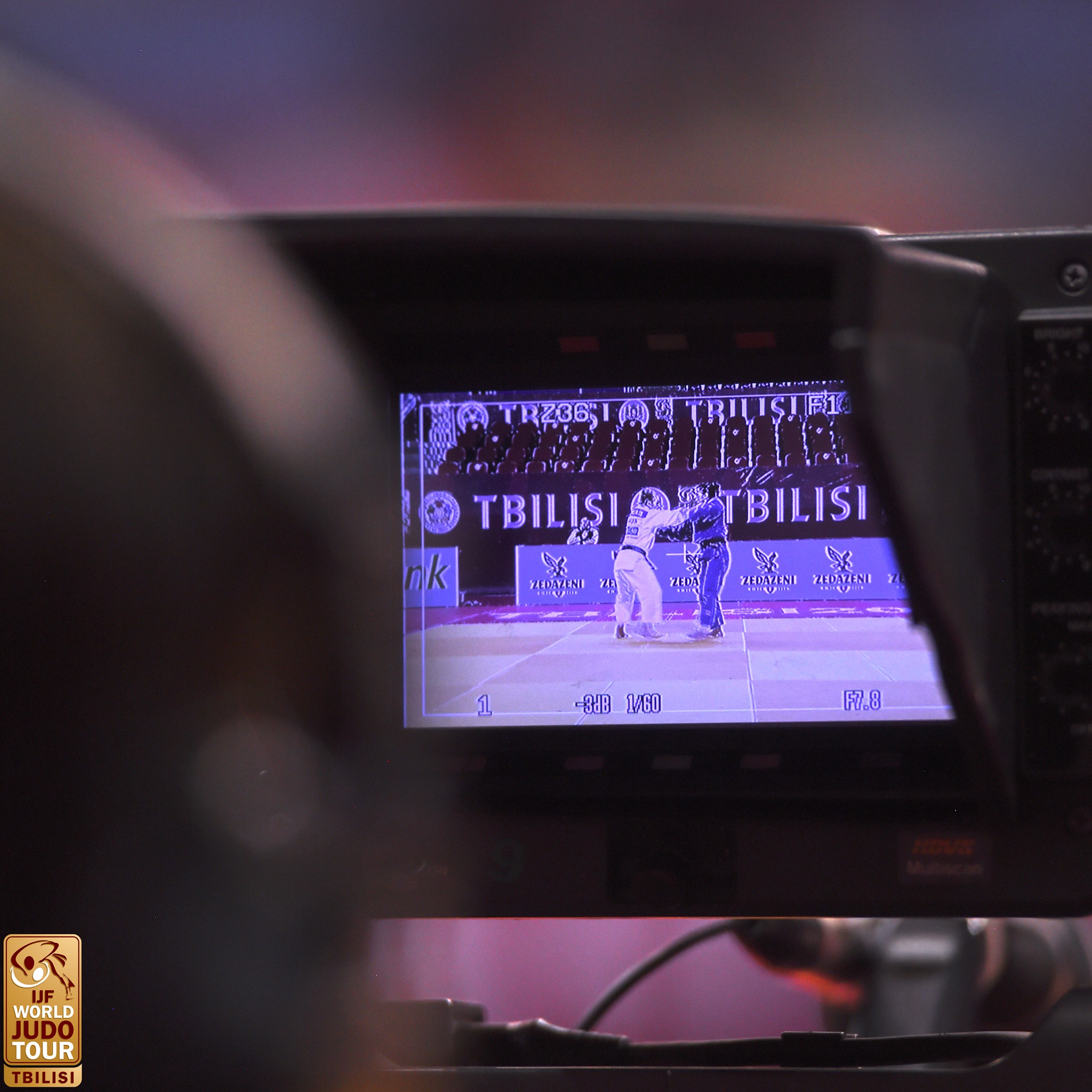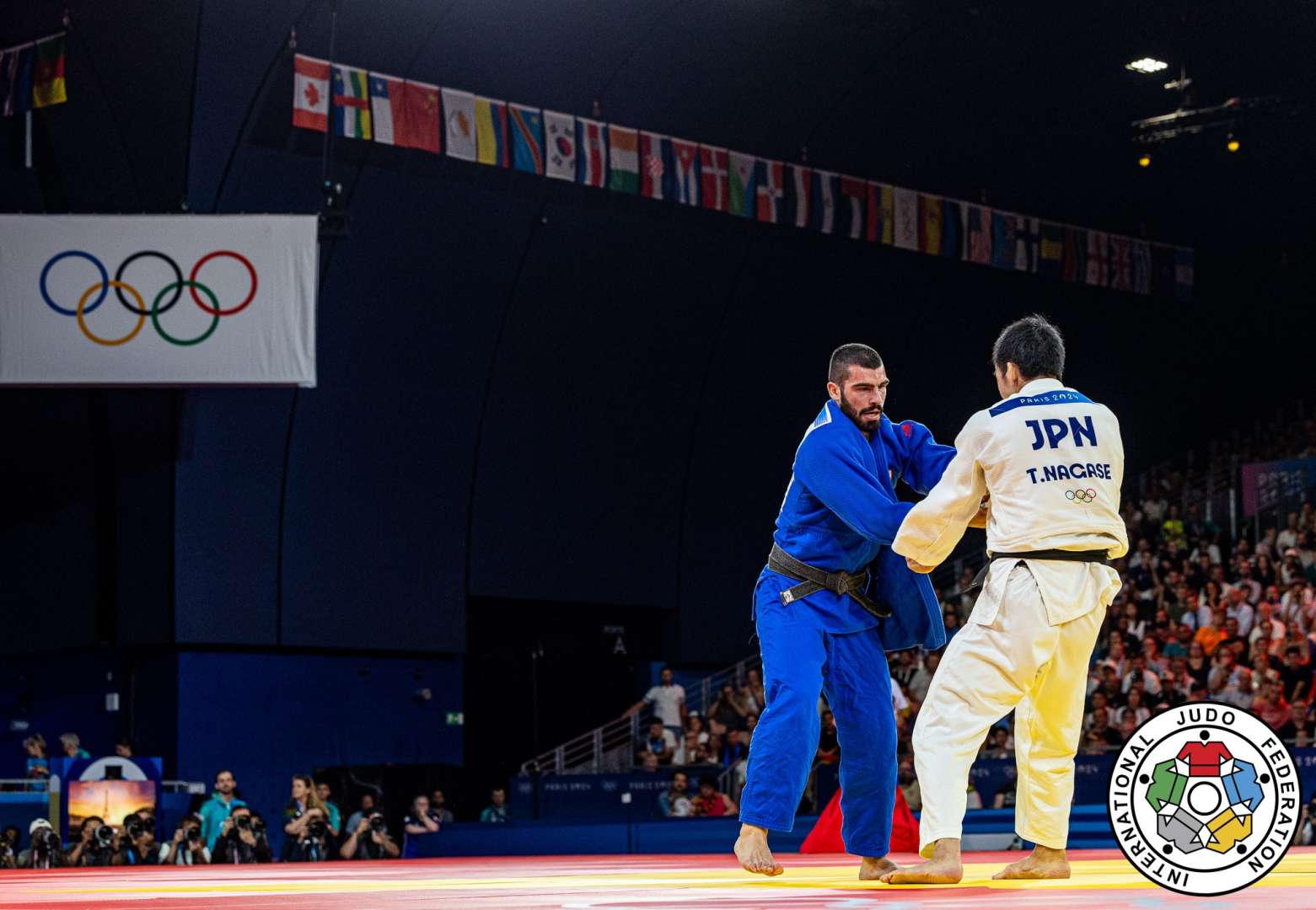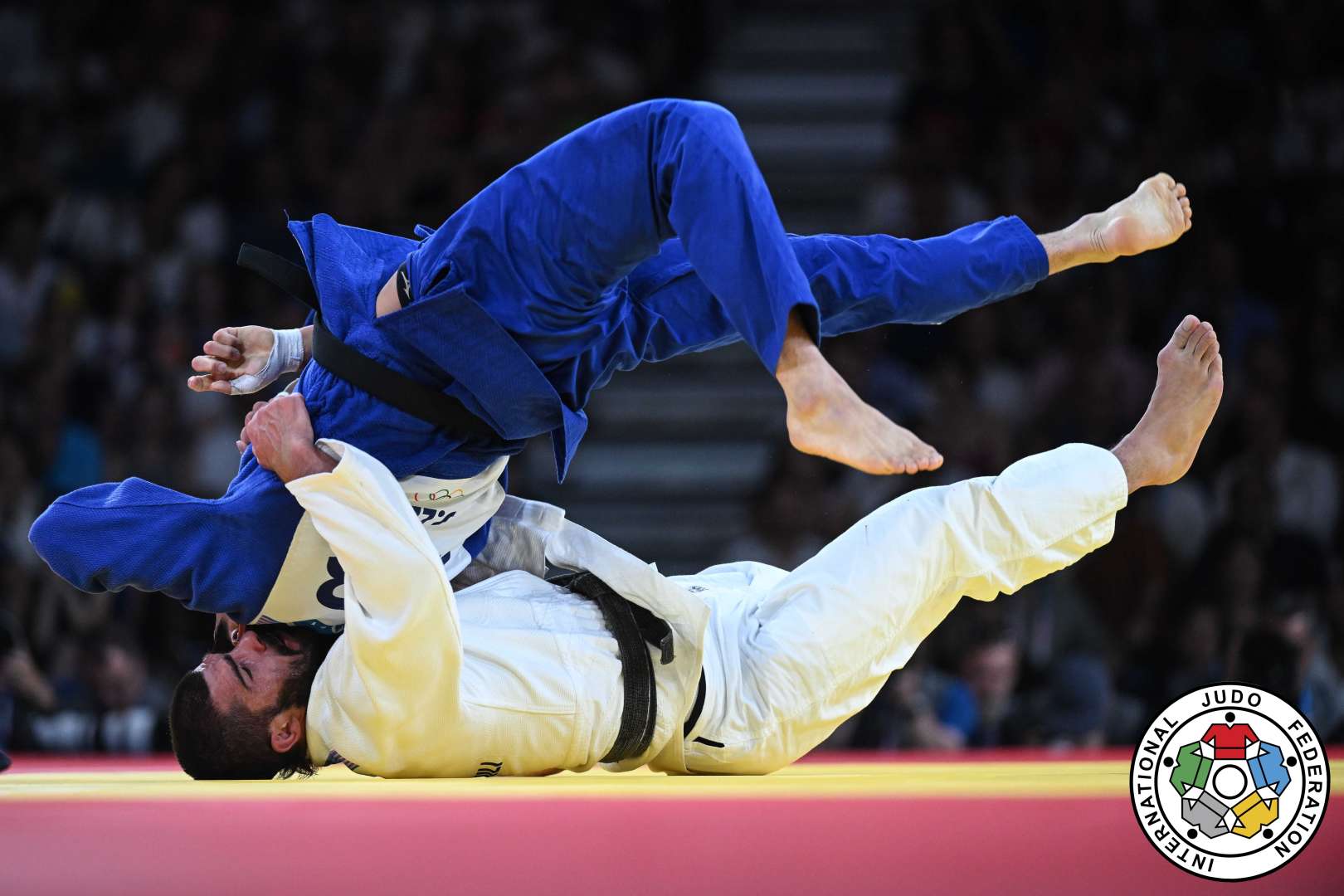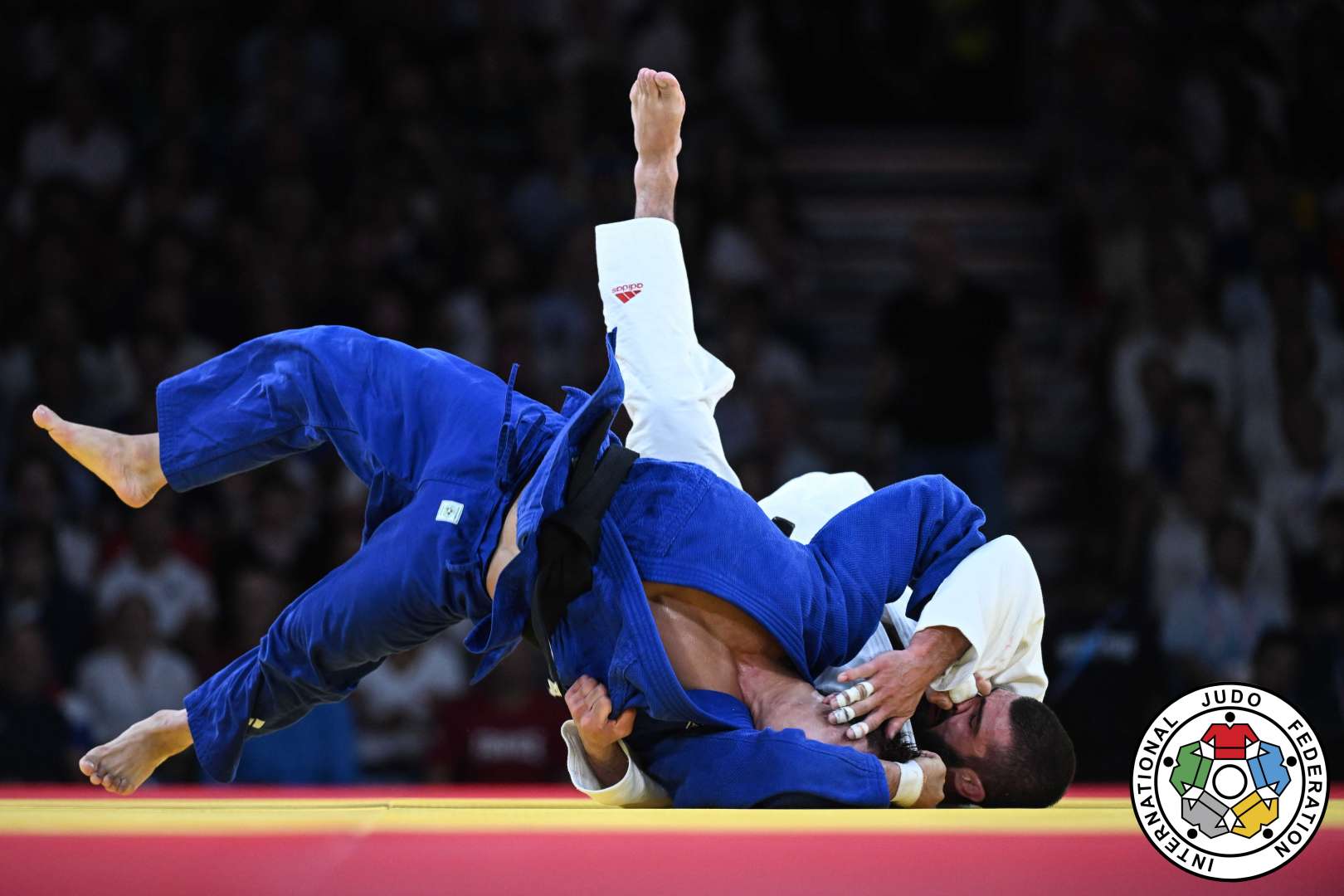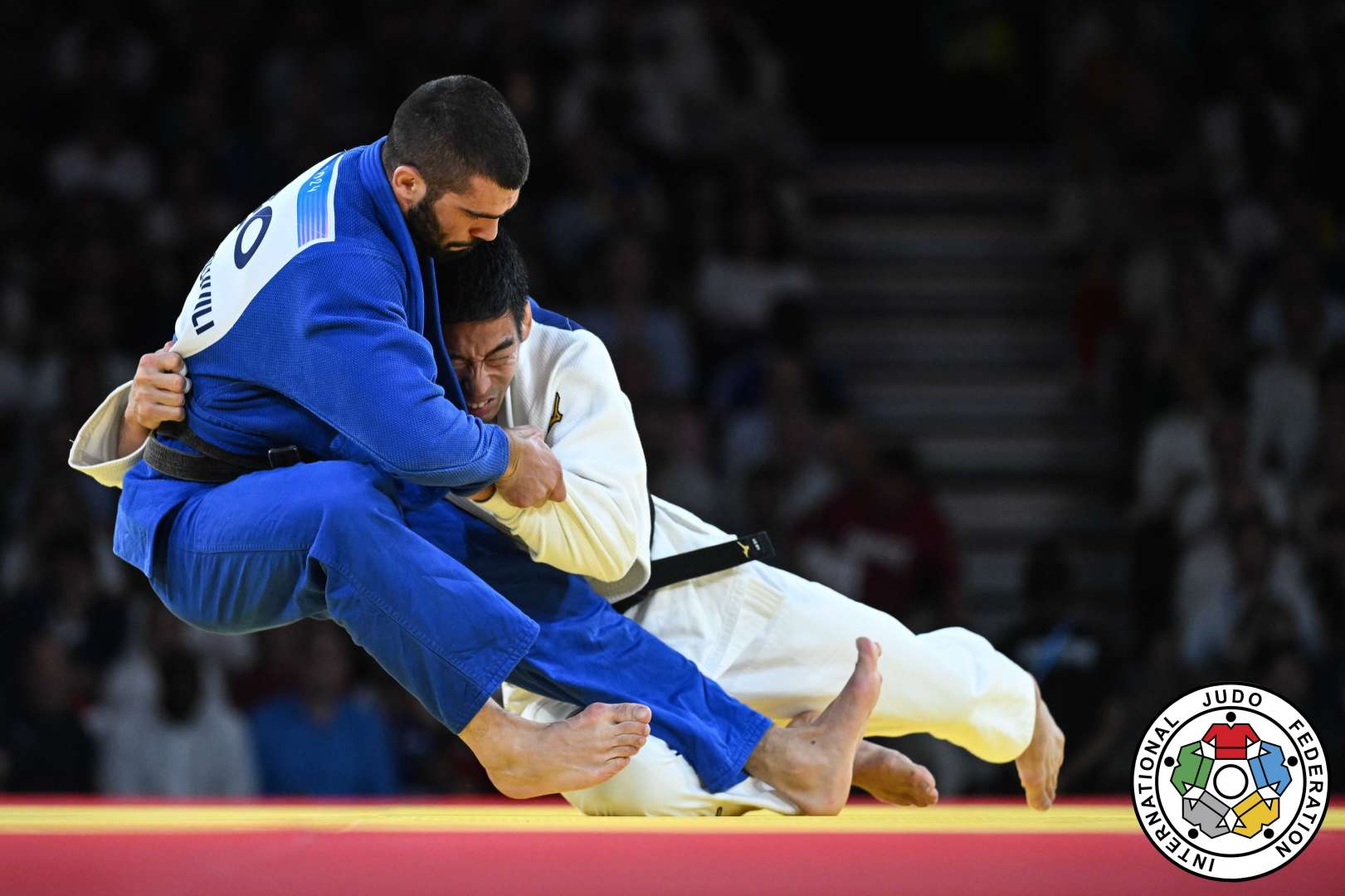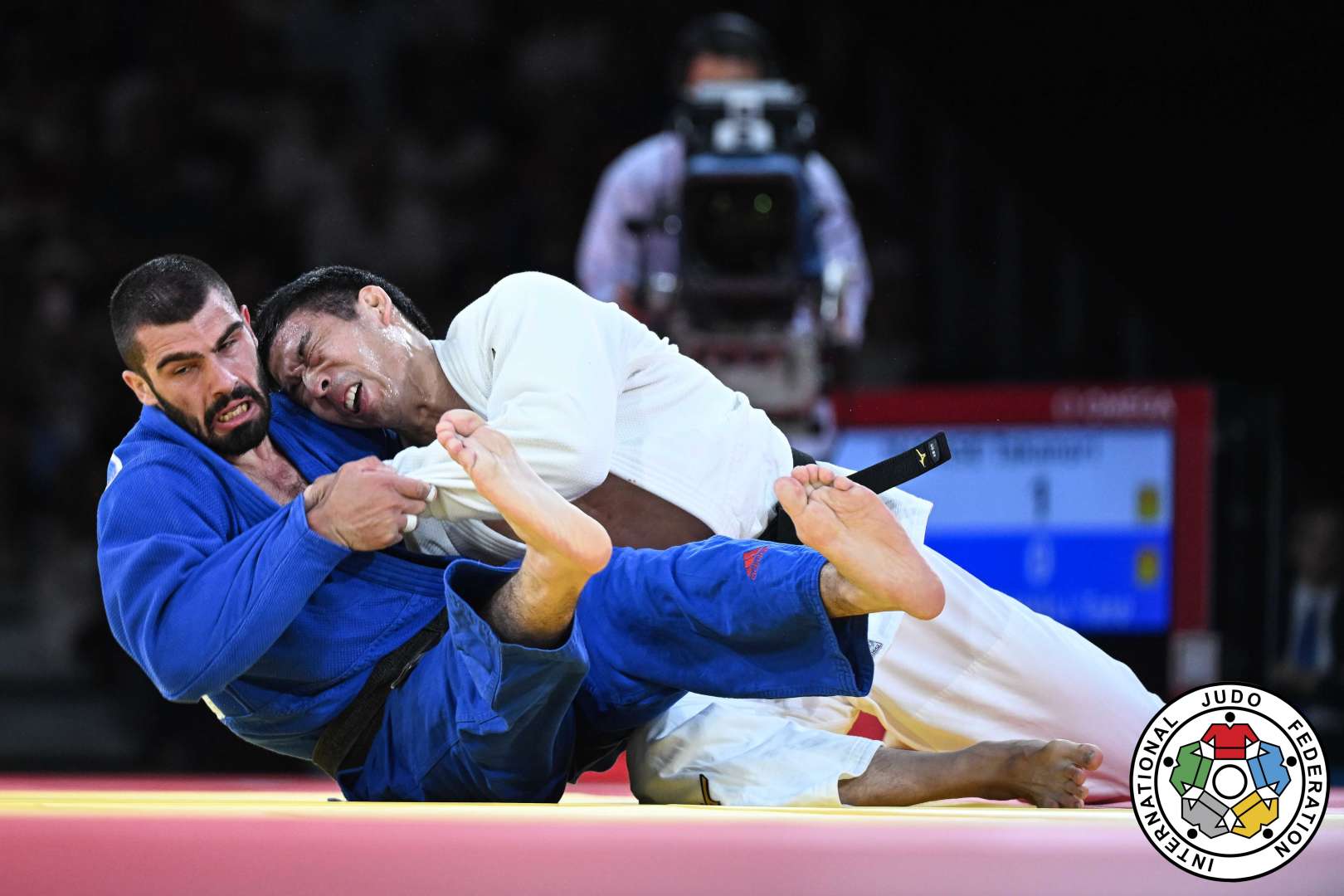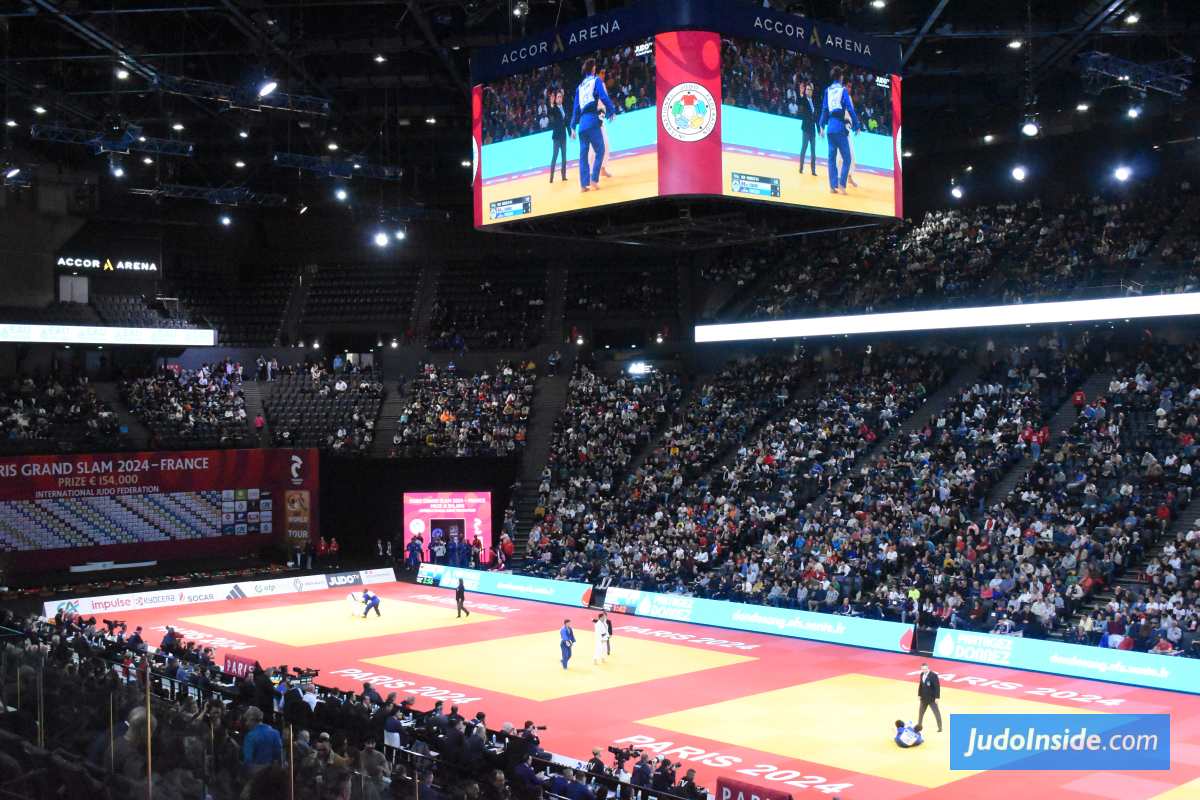Report of the European Championships 2001 in Paris Day 3

 20 May 2001 19:50
20 May 2001 19:50
 TWOJ, the world of Judo, by Barnaby Chesterman
TWOJ, the world of Judo, by Barnaby Chesterman

The final day of competition at the 2001 European Judo Championships took place in front of a disappointing crowd. The French seem to come out in force for the Tournoi de Paris and the chance to watch their heroes take on the very best from Japan, Korea and Cuba, but run-of-the-mill European competition doesn't capture their imagination in quite the same manner. And that despite four reigning Olympic champions fighting yesterday and another today in the form of Husein Ozkan, not to mention their own World champion Larbi Benboudaoud.
Those two were the star attraction in a very competitive under 66kg category that also included the World junior champion, Renat Mirzaliyev of Ukraine. But the European Championships is famous for deviating from the script and this was to be no exception
Women's under 52kg
With the two finalists from last year on opposite sides of the draw, there was every probability that they could meet in a repeat of the Wroclaw final. The champion, Laetitia Tignola of France, began well, armlocking Antonia Cuomo of Italy quickly in her first fight. But then she came unstuck against Inge Clement of Belgium, thrown for Ippon with Kochike-taoshi. Clement leapt into the air after a stunning upset of the favourite in front of her home crowd.
Clement then faced Iona Dinea of Romania in the semi-final. Dinea was spectacular in reaching the last four, throwing both Joana Ramos of Portugal and Ana Carrasgosa of Spain for Ippon in the first two rounds. But the Romanian had no answer to the inspired Clement and lasted just over a minute into the semi-final, before being thrown for Ippon with Uchi-mata.
On the other side, Georgina Singleton avoided the same fate as befell Tignola but was pushed hard by her first two opponents. Firstly Carol Johansson of Sweden took her the full five minutes, and then so too did Viktoria Nagy of Hungary. In both bouts, though, Singleton accumulated a handful of small scores to progress. In the semi-final she met Isabell Schmutz of Switzerland beat Kristi Najaryan of Armenia in the first round before throwing Barbara Krzywda of Poland for Ippon with a brilliant left Ippon-seoi-nage.
The Briton took an early lead when Schmutz was penalised for passivity. The two swapped penalties later in the fight and Singleton was all set to hold on until 15 seconds from the end when Schmutz pulled it out of the bag with a Ko-uchi-gari for Yuko.
The unlikely finalists put up quite a show for the crowd with first Clement scoring Yuko from a throw and then Schmutz levelling the scores with her own Yuko. Clement was the favourite having won the title once before in 1997, although Schmutz was a bronze medallist in 1999 so had some pedigree behind her. The greater experience told in the end, though, and Clement scored a decisive Waza-ari with a leg-grab turnover to seal the title.
The repeat of last year's final did happen, only in a bronze medal contest. Unfortunately, though, the judo wasn't the main talking point. For the record, Tignola won by scoring Waza-ari with Ko-soto-gari, but it was that moment that turned the fight into a farce. Tignola scored with the throw and the referee awarded Ippon. Both judges signalled for Waza-ari so the referee changed his mind, with both fighters still lying on the ground. Singleton was first to react and dived on top of Tignola to apply a hold, only for the referee to inexplicably call matte. The referee then proceeded to lose the plot as he missed a perfectly good Sangaku-gatame hold for Tignola just 30 seconds later. Having allowed Tignola time to manoeuvre into the hold, when she did apply it, he called matte. That was proceeded by a trip to the officials table, seemingly to have the rules of judo explained to him before continuing.
Unfortunately that was not the only occasion of the day when the referees caused havoc on the mat. In fact that particular incident was nothing compared to another in the women's Open, but more of that later. The second bronze medal went to Dinea who took just 30 seconds to throw Armenia's Kristi Najaryan for Ippon. However, it was nice to see a woman from Armenia competing for a medal, and following in the footsteps of the men who have already stamped their mark on men's judo.
Men's under 66kg
All eyes were on Olympic champion Hysein Ozkan of Turkey and World champion Larbi Benboudaoud of France, but just as last year, neither could raise their level to previous heights in the less prestigious European competition. But considering Europeans have dominated this category for the last couple of years this can almost be considered a World Championship in all but name.
Benboudaoud had impressive victories with Juji-jime against Mike Goepfert of Germany and with O-goshi for ippon against Aleksandre Shlyk of Belrus to spark hopes of recapture the crown he won in 1998 and 1999. But it was a false dawn as he lasted barely a minute before being thrown for Ippon by Jozef Krnac of Slovakia in the Quarter-final.
Krnac's victory spoilt hopes of a semi-final between the junior and senior World champions, as Renat Mirzaliyev of Ukraine was making impressive progress. He scored a quick victory against Gueorgui Gueorguiev of Bulgaria, pinning him for Ippon with Yoko-shiho-gatame. Then he faced Vladimir Oleinic of Moldova for a place in the semi-finals and soon threw him for Waza-ari with Kata-guruma. Mirzaliyev also scored Yuko with left Uchi-mata but ultimately won after Oleinic accumulated Keikoku to hand the fight to the Ukrainian.
The semi-final was then a short-lived affair as the World junior champion demonstrated his future credentials. The fight lasted just 42 seconds, in which time Mirzaliyev twice flattened Krnac. First the Slovak went down for Waza-ari, and then again for Ippon, both times with Kata-guruma. So the Ukrainian marched into his first senior European final.
Ozkan, meanwhile, was being made to work hard by Chris Christodoulides of Cyprus in the first round. The plucky Cypriot several times came close to turning Ozkan over with big Te-guruma pick-ups, but eventually he was thrown for Ippon. European junior silver-medallist, Joao Pena of Portugal also made the Turk work hard. But despite lasting the full five minutes, he did so only by stubborn defence. Ozkan then faced David Margoshvili of Georgia who was enjoying a rare international appearance in a category that usually contains the entertaining Olympic bronze-medallist, Georges Vazagashvili. Margoshvili threw Denis Kozlov of Latvia for Ippon with Morte-gari and then shocked Ozkan by winning through to the semi-finals.
Margoshvili started more positively, scoring Yuko with Te-guruma. Ozkan could do little more than defend at first and had accumulated keikoku before he registered a score. When he did it was a Waza-ari with Uki-waza, but that wasn't enough and the Georgian progressed. Ozkan couldn't pick himself up after that and also bowed out of the repechage against Kozlov.
Another surprise semi-finalist was Milo Mijalkovic of Yugoslavia, squeezing past the impressive Armenian, Mesrop Barbaryan, who's fighting certainly lives up to his name, and then overcame Gabor Neu of Hungary to face Margoshvili. The Yugoslav couldn't progress any further, though, and succumbed to a Waza-ari, with Margoshvili proceeding to the final.
Maregoshvili may have harboured hopes of winning his first European title, but they didn't last very long. Mirzaliyev was on fire and looking every inch a future senior World or even Olympic champion. The Ukrainian surpassed even his semi-final demolition job, needing just 23 seconds to throw the Georgian for Ippon with a spectacular Sode-harai-goshi. It was an unorthodox technique but nothing less than has come to be expected of this brilliant young prospect.
Benboudaoud recovered enough to win a bronze medal in front of his home crowd and give his fanatical fans some cheer. His decisive score against Mijalkovic came via Sumi-gaeshi for Yuko, although the Yugoslav also picked up Chui in penalties and Benboudaoud never looked like losing this fight. His conqueror also picked up a bronze, in a fight between the conquerors of the two favourites. Krnac won the medal, throwing Kozlov for Ippon.
Women's under 48kg
This was yet another tiny women's category, as often happens in years when Olympics or World championships are being held. Countries that can only afford to send their fighters to one major championship tend to opt for the bigger one.
There were just 13 fighters in the draw, although one of those was last year's European and Olympic silver-medallist, Lioubova Brouletova of Russia. She lasted just 45 seconds, though, before being pinned for Ippon with Yoko-shiho-gatame by Frederique Jossinet of France. Jossinet was standing in for regular first choice, Sara Nichilo-Rosso, although with that result she will have done her World Championship hopes no damage at all.
Jossinet was in fine form and swept past Anna Zemla-Krajewska of Poland with a slick Ippon with Tai-otoshi which she switched from to from an original Uchi-mata attack. Jossinet then had a tough test against Ann Simons of Belgium, another Olympic medallist from Sydney, but won through to the final by virtue of a koka.
Last year's champion, Laura Moise of Romania, was also in dominant form and had a good victory against the awkward Spaniard, Vanesa Arenas. Moise scored Waza-ari compared with Yuko for Arenas and went through to face Tetya Lusnikova of Ukraine. She was no match for the champion and was quickly bowled over for Ippon with Te-guruma as Moise advanced to a semi-final against Giuseppina Macri of Italy. She too was fighting well but made one mistake in the semi-final and Moise capitalised to pin her for Ippon with Yoko-shiho-gatame.
That put her into the final and a shot at a second straight title. But Jossinet was in no mood to let down the home fans and she was competitive form the off. Moise twice came close to scoring with pick-up techniques. But it was in attempting a classical throw that she ultimately came undone. Moise attacked with Uchi-mata but the French woman rode it and unbalanced the Romanian, turning her onto her back as she fell for a skilful Ippon and the European title at her first attempt after playing third fiddle to Sylvie Meloux and Nichilo-Rosso for so long.
The two beaten semi-finalists bounced back well to take bronze medals in vastly contrasting bronze fights. Macri needed just 40 seconds to breeze past Zemla-Krajewska, scoring Ippon through a submission from an armlock. Simons, on the other hand, needed to fight to the very end of her contest with Arenas to claim her place on the podium thanks to a solitary Koka from Kouchi-gari.
Men's under 60kg
This category was dominated by the Asians at last year's Olympics taking five of the top six places. In fact just one European finished in the top eight, and that was the European champion Elchin Ismaylov.
Ismaylov overcame Ruslan Mirzaliyev of Ukraine, the brother of the under 66kg champion, in his first fight by Hansoku-make and then had a huge let off in the quarter-final. Omer Izhaki of Israel led Ismaylov by two Yuko's to a koka with just six seconds remaining when he attempted an Uchi-mata attack. Ismaylov was putting him under intense pressure in a desperate bid to retain his title. But as Izhaki drove towards the mat he did a head-roll, which earned him an automatic disqualification.
Ismaylov was forced to do the hard work himself in the semi-final, and that he did by throwing Siarhei Novikov for Ippon with a left Uchi-matta. Last year he faced Eric Despezelle of France in the final, and this year it looked ever likely that he would have to face another.
Cyril Soyer was grasping his first opportunity in a European championships with both hands. Soyer disposed of Vladimir Degtiarev of Russia with two left-sided Uchi-matas. The first scored Waza-ari and the second was rewarded with Ippon. Soyer then scored Ippon with the same throw against Andre Veste of Moldova and then beat the 1998 champion Nestor Khergiani of Georgia by Ippon with a left O-uchi-gari.
Soyer's semi-final against Cedric Tamans of Belgium was an incredibly close encounter and the tension was unbearable right up to the final second. Both fighters picked up two penalties but Soyer edged it with a Yuko and Koka, both scored with Te-guruma. Even though Taymans didn't manage to put a score on the board, he still came close on numerous occasions and Soyer only scored his Koka in the dying moments.
That set up Ismaylov's second successive final against a Frenchman and just as last year, it was very close. The Azerbaijani picked up a Shido and Soyer scored Yuko with a Tani-otoshi type take down and led until about half way through the fight. The crowd voice its noisy support for the Frenchman, but in an amazing turn of events he was disqualified for head-diving attempting Uchi-mata, just as Izhaki had done. Despite howls of derision from the crowd, Ismaylov took the title, incredibly courtesy of three disqualifications out of four fights. The crowd protested so much that Jean-Luc Rouge, the EJU sports director, took the microphone to explain why Soyer was disqualified. Such head-rolling is dangerous for a fighters neck and the rule was introduced for their own protection.
Taymans came back to win a bronze medal in another extraordinary refereeing display. The Belgian trailed Laurentis Alexanidis of Greece by Waza-ari and a penalty with just seconds remaining. Taymans caught Alexanidis with a very late Seoi-nage for Waza-ari but almost immediately the referee called matte. There were three seconds left on the clock but the time-keepers failed to stop the clock and the final bell rang. The referee let the fight resume, presumably to finish off the last three seconds, but this time the time-keepers never started the clock. Taymans pushed Alexanidis to the floor after several seconds and the referee, unjustly, gave the Greek a penalty, with now four seconds left on the clock, a whole second more than there had been almost half a minute earlier. After yet another discussion with table officials, a golden period began. Of course Taymans got the score, again a little dubiously, and once again a fighter was robbed by poor refereeing.
Khergiani won the other bronze medal to add to his collection of European medals but had to come from behind to overcome Novikov. The Belarussian led by Waza-ari with Kata-guruma, but Khergiani didn't give up and turned it around. He dragged Novikov down to the mat and then pinned him for 25 seconds to win his fourth European medal. In fact three of the medallists were identical to the previous year, the only difference being a different Frenchman in the silver medal position.
Women's Open
Another small field with just 12 competitors, but it was encouraging to see a couple of lighter weight fighters trying their luck. One of those was Karin Kienhuis of the Netherlands, but she was the victim of more outrageous refereeing. Kienhuis faced Sandra Koeppen of Germany in the first round. Koeppen led by Waza-ari when attempting a throw, only to land in an armlock. Kienhuis' arm was injured, and after discussion with his corner judges, the referee disqualified Koeppen and awarded the fight to Kienhuis.
Kienhuis left the mat and went to get treatment on her injured arm. Meanwhile the referee was called to the officials table and, presumably, had the rules explained to him. Koeppen had not left the mat and there was a long delay as Kienhuis was brought back out, only to be disqualified and the fight awarded to Koeppen. Quite what the reasoning behind that was is far from clear, but what is clear is that the refereeing on this final day was a total shambles.
Koeppen then beat the other lighter fighter, Catarina Rodrigues of Portugal before facing Karina Bryant of Britain in the semi-final. It was a close encounter, but Bryant never got going and Koeppen scored Yuko with a Harai-makikomi to take her place in the final.
In the other half of the draw, Brigitte Olivier looked to be the favourite and she started well, scoring Waza-ari against former European junior champion, Anne-Sophie Mondiere of France. The French woman had a Koka to her name but then drama ensued towards the end of the bout as Olivier picked up three quick penalties to throw away the fight. Mondiere then beat Susan Somolinos of Spain before disposing of Clementina Papa of Italy half-way through their semi-final encounter with a brilliant drop Seoi-nage.
The giant Koeppen was always going to be the favourite in the final having twice before won bronze medals and having also finished fifth in last year's World Championships. Mondiere tried to score with her drop Seoi-nage, but it takes a lot to move Koeppen and one weak attack from the French woman proved fatal. Koeppen took her backwards for Waza-ari and then applied a crushing hold for Ippon.
Bryant, who was the reigning over 78kg champion, gained some consolation by throwing Mara Kovacevic for Ippon with Koshi-guruma to take a bronze medal. The woman she beat in last year's final, Irina Rodina of Russia, joined her on the podium by squeezing past Papa by a single penalty.
Men's Open
The final category of the tournament through up an intriguing first round contest between Jerome Dreyfus of France, the Tournoi de Paris champion, and Alexandre Mikhailine of Russia, the 1999 World bronze medallist at under 100kg. Dreyfus can pull out great throws on his day, but this was not one of them. Mikhailine made short work of the Frenchman with a spinning left Uchi-mata for Ippon.
Next up for the talented Russian, who has dropped to number two in Russia behind Tamerlan Tmenov since stepping up to the top weight category, was the three-time European champion, Selim Tataroglu of Turkey. Mikhailine fought a tactical battle against his much bigger opponent, who had produced the throw of the day with a Koshi-guruma on Denis Werner of Germany in the first round. The Russian kept Tataroglu moving and wound him up to Hansoku-make. The he took on Ragmaz Chochoshvili of Georgia for a place in the final and overcame him with Yoko-shiho-gatame for Ippon.
In the final he would meet Dennis van der Geest of the Netherlands who made light work of the weaker side of the draw. Van der Geest twice threw Gabriel Munteanu of Romania for Waza-ari in the first round and then scored a Yuko to overcome Karoli Usinskas of Lithuania in the quarter-finals. He was at his very best in the semi-final against Zolta Csizmadia of Hungary in the semi-final and quickly scored Ippon with a brilliant Ashi-guruma, reminding fans of his finest hour in winning the European over 100kg title last year.
But the final was a total mismatch as Mikhailine dominated from the off. He caught van der Geest with a left Ko-soto-gari for Waza-ari and the big Dutchman had to wriggle like a hare caught in a trap to escape being pinned as well. But the end was not postponed for long as the tall Russian imposed himself on the Dutchman. Van der Geest flopped to his knees and Mikhailine pounced, turning him onto his back with a hand-wheel for a second Waza-ari and the title.
Csizmadia of Hungary bounced back from his swift semi-final embarrassment to score a lighting-quick Ippon against Franz Birkfellner of Austria. The fight lasted less than ten seconds as the Hungarian slammed his opponent into the mat with a left-sided O-soto-gari. Chochoshvili joined him on the podium with a brilliant Ippon against Georgi Tonkov of Bulgaria. The Georgian scored Ippon with a Khabarelli pick-up, although some people may remember that it was Chochoshvili's father, Shota, who first demonstrated that pick-up technique to the rest of the world before Khabarelli made it famous.
So at the end of an entertaining tournament, the Belgians topped the medal table with three gold, a silver and three bronze. France came second with two gold three silver and five bronze on home soil, but theirs was an impressive total haul of ten, one of the highest ever. Ukraine was the surprise package winning two gold medals and certainly Mirzaliyev is a fighter to watch out for at the World championships in Munich in July.
 like
like
 share
share
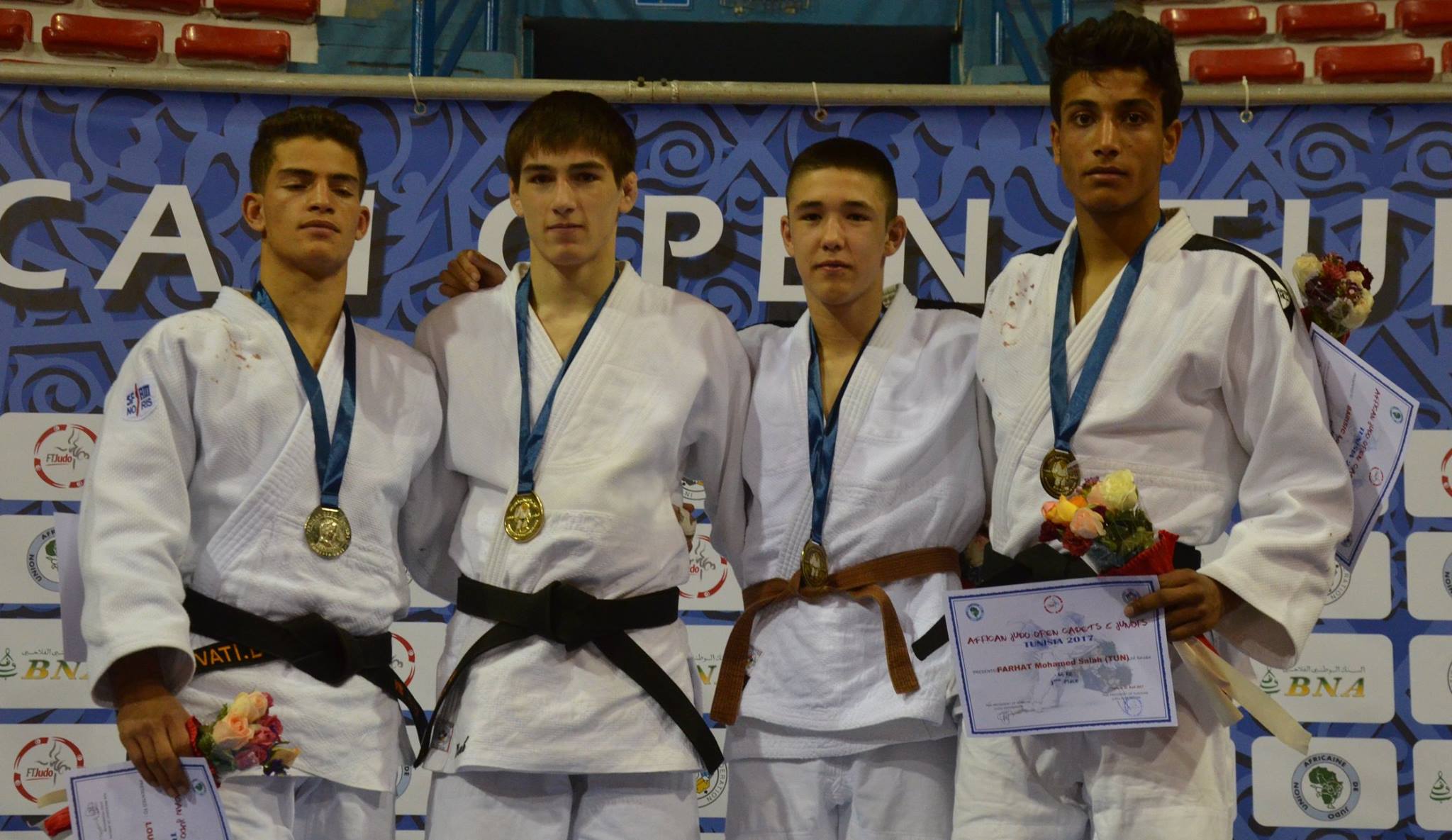
| Result | City | Date |
|---|---|---|
| 2 | Paris | 2024 |
| 1 | Abu Dhabi | 2024 |
| 1 | Zagreb | 2024 |
| 3 | Belgrade | 2023 |
| 2 | Montpellier | 2023 |






